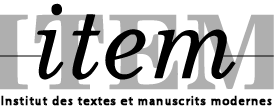25/03/2008
Venue: e-Science Institute, 15 South College Street, Edinburgh
The conference is organised and hosted by the e-Science Institute, National e-Science Centre, and supported by the University of Edinburgh, the Italian Institute in Edinburgh, and the French Institute in Edinburgh.
pan style= »font-weight:bold; »>ABOUT THE CONFERENCE
The discussions at this conference focus on both the theoretical and practical issues encountered in the creation of digital texts and both critical and genetic editions. The implications for research and teaching will be examined and current projects in the field will be
presented. The aim of the conference is to approach these issues from an international perspective, in order to establish collaboration in research and teaching, and to provide new contributions to the field as a result. Workshops will provide a forum for discussing experiences, ideas, issues and new tools related to Digital Philology with students. The conference welcomes both leading scholars and young researchers working on the problems of textual criticism and editorial scholarship in the electronic medium, as well as students, teachers, librarians, archivists, and computing professionals who are interested in representation, access, exchange, management and conservation of texts. The conference will be webcast in order to allow wider participation. Video webcasts will be archived on the E-Science Institute website.
KEYNOTE SPEAKERS
The conference aims to encourage international conversations and networking between participants in different projects and countries, and to offer an international perspective on the issues of textual criticism and editorial scholarship in the electronic medium. As the conference is actively promoting a European perspective, speakers will come from different European countries. Keynote speakers will be academic scholars renowned in the field of Digital Philology. The following have confirmed their participation:
Peter Robinson, University of Birmingham, UK;
Jean-Louis Lebrave, Institut des Textes et Manuscrits, CNRS / ENS, France;
Paolo DIorio, Institut des Textes et Manuscrits CNRS / ENS, France;
Domenico Fiormonte, Roma Tre University, Rome, Italy;
Andrea Bozzi, Istituto Linguistica Computazionale, CNR, Pisa, Italy;
Edward Vanhoutte, CTB – Centrum voo Teksteditie en Bronnenstudie, Koningstraat, Belgium;
Manfred Thaller,University of Cologne, Germany.
SUBMISSIONS
TOPICS:
We welcome proposals that discuss any aspect of the interaction between ICT and philology. In order to provide a good overview of the current state of Digital Philology, the conference will focus on four main topics:
1. Tools: Pieces of software; technologies and multimedia tools employed to create digital critical and genetic editions; multimedia archives and collaborative publications (representation, cataloguing, collation, comparison, textual analysis, textual genesis, interchange, management
and preservation of manuscripts and printed editions in text/image/audio/video format).
2. Products: Digital critical and genetic editions, multimedia archives, and collaborative publications available on CD-ROMs and/or on the World Wide Web (current projects, work in progress, updates on continuing mature projects).
3. Methodologies: Impact of ICT on philological studies
Methodological approaches used when preparing a digital edition Accomplishment of a digital edition that is truly new and innovative What ICT in textual criticism enables scholars to do that could not be done before Digital philology as traditional philology in a new fashion Digital philology as a new discipline in itself Relation between digital and traditional philology Collaborative publication of digital editions / Collaborative philological research in a virtual environment.
4. Learning/Teaching: The use of critical and genetic editions and multimedia archives in
learning/teaching languages, linguistics, literature, history, palaeography, creative writing, textual criticism, digital philology.
TYPES OF PROPOSAL:
Paper: Proposals for papers should be no less than 750 words. Papers will be allocated 50 minutes for presentation, including a 10 minute question-answer session.
Workshop: Proposals for workshops should be no less than 500 words. Workshops will be allocated 50 minutes for presentation, including 30 minutes of collaborative work.
There should be no difference in quality between papers and workshop presentations. The same academic standards should apply in both cases, but workshops may be a more suitable way of presenting projects with teaching and interactive purposes, since they provide an opportunity for students to exchange ideas, methods and techniques with international scholars. The choice between the two modes of presentation should depend on the most effective and informative way of communicating the scientific content of the proposal.
Proposals are peer-reviewed.
FORMAT OF PROPOSAL
All proposals must be uploaded onto the PROPOSAL area on the main webpage (link eSI) in PDF format. Please pay particular attention to the format given below. Proposals which do not conform to this format, or which arrive after the deadline will not be considered. The information required for all proposals includes:
Type of proposal: paper, workshop
Title: title of paper, workshop
Keywords: three keywords (maximum) describing the main contents of the
paper or workshop
Author: name of first author
Affiliation: of first author
E-Mail: of first author
Author: name of second author (repeat these three headings as necessary)
Affiliation: of second author
E-Mail: of second author
The deadline for proposals is 25th February 2008
Proposals and Presentations should be done in English.
REGISTRATION
Registration is through the E-Science Institute website : http://www.nesc.ac.uk/esi/
CONTACT US
If you require any further information please contact Cinzia Pusceddu, Conference Organiser, on 0044 (0)131 6503746 or by
email: cinzia.pusceddu@ed.ac.uk.












